自考现代英语语法学习笔记 第一章 绪论
自考英语专业综合英语笔记上册(第一课)
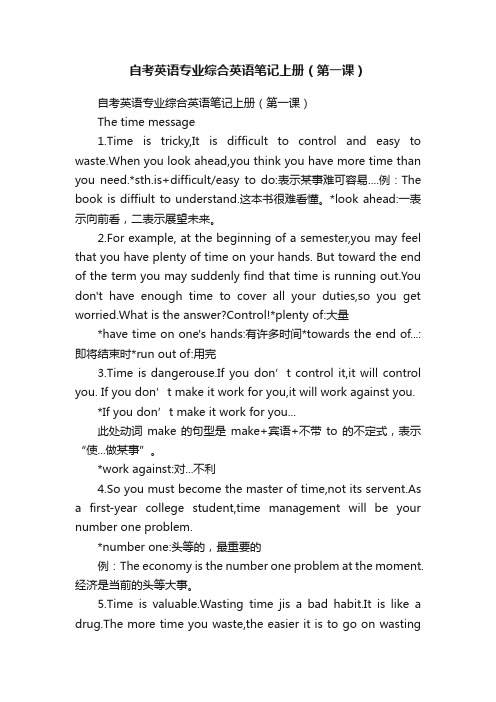
自考英语专业综合英语笔记上册(第一课)自考英语专业综合英语笔记上册(第一课)The time message1.Time is tricky,It is difficult to control and easy to waste.When you look ahead,you think you have more time than you need.*sth.is+difficult/easy to do:表示某事难可容易....例:The book is diffiult to understand.这本书很难看懂。
*look ahead:一表示向前看,二表示展望未来。
2.For example, at the beginning of a semester,you may feel that you have plenty of time on your hands. But toward the end of the term you may suddenly find that time is running out.You don't have enough time to cover all your duties,so you get worried.What is the answer?Control!*plenty of:大量*have time on one's hands:有许多时间*towards the end of...:即将结束时*run out of:用完3.Time is dangerouse.If yo u don’t control it,it will control you. If you don’t make it work for you,it will work against you.*If you don’t make it work for you...此处动词make的句型是make+宾语+不带to的不定式,表示“使...做某事”。
自考“英语(一)”课堂听课笔记第一章(2)

自考“英语(一)”课堂听课笔记第一章(2)This is an incomplete sentence, please add the omitted part and make it complete.〔这是一个不完整的句子,请加上省略的成分使其完整。
〕I don’t think I can complete the work in 2 hours. 〔我想我在两小时内干不完这活。
〕15. purpose n. 目的,意图,用途purposeful adj. 有目的的,有意图的purposefully adv. 有目的地,蓄意地The purpose of the meeting was to discuss his proposal.〔会议的目的是讨论他的建议。
〕He let out the information purposefully to you.〔他有意向你透露了这个消息。
〕16. regularly adv. 经常地,按期地regular adj. 经常的,按期的irregular adj. 不规则的,无规律的If you review your lessons regularly, you will do well on tests.〔如果你按期复习功课,就能在考试中取得好成绩。
〕17. technique n. 技术,技巧,手艺Good study techniques help him to be one of the straight A students in his class.〔良好的学习技巧使他成为班上的全优生之一。
〕18. outline v.& n. 概括;大纲,提纲;轮廓He listened carefully as I outlined my reasons.〔在我简述我的原因时,他认真地听着。
〕The English teacher asked us to write a brief outline of the story.〔英语老师让我们写这篇故事的概要。
自考英语(一)复习资料第一章(3)
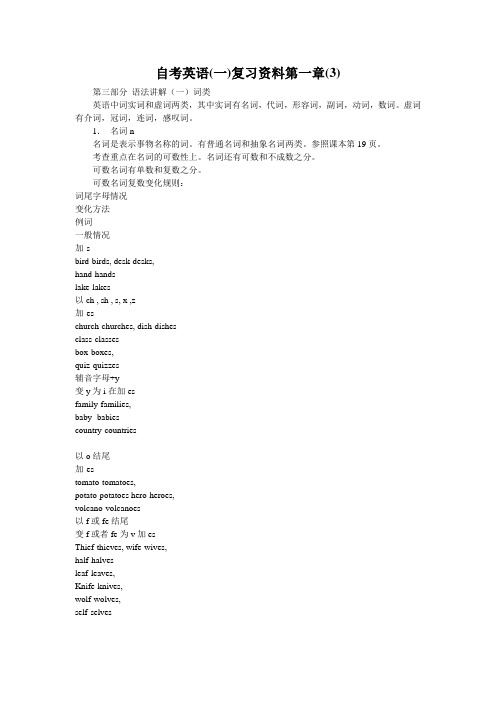
自考英语(一)复习资料第一章(3)第三部分语法讲解(一)词类英语中词实词和虚词两类,其中实词有名词,代词,形容词,副词,动词,数词。
虚词有介词,冠词,连词,感叹词。
1.名词n名词是表示事物名称的词。
有普通名词和抽象名词两类。
参照课本第19页。
考查重点在名词的可数性上。
名词还有可数和不成数之分。
可数名词有单数和复数之分。
可数名词复数变化规则:词尾字母情况变化方法例词一般情况加-sbird-birds, desk-desks,hand-handslake-lakes以ch , sh , s, x ,z加-eschurch-churches, dish-dishesclass-classesbox-boxes,quiz-quizzes辅音字母+y变y为i在加esfamily-families,baby- babiescountry-countries以o结尾加-estomato-tomatoes,potato-potatoes hero-heroes,volcano-volcanoes以f或fe结尾变f或者fe为v加esThief-thieves, wife-wives,half-halvesleaf-leaves,Knife-knives,wolf-wolves,self-selves注:a.以元音字母+y结尾的名词,直接加-s, 如:play-plays, boy-boysb.以o结尾的名词,直接加-s,如:photo-photos, bamboo-bamboosc.以f 或者fe结尾,直接加-s,如:belief-beliefs, cliff-cliffs2.冠词article冠词有不定冠词(a, an) 和定冠词(the) 不定冠词用来修饰可数名词单数,表示一个,一件….,the 可以与可数名词连用,也可以与不成数名词连用,表特指。
A用在辅音(音素)开头的可数名词单数前边,an 用于元音(音素非字母)开头的可数名词单数前面。
自考现代英语语法重点

自考现代英语语法重点(总24页)-CAL-FENGHAI.-(YICAI)-Company One1-CAL-本页仅作为文档封面,使用请直接删除Chapter 1 The Structureof the English Sentence(第一章绪论)一、难点、重点1.Present the grammatical units that form a hierarchical order.(指出构成层次结构的语法单位.)英语句子的结构层次是:分句(clauses)、词组(phrases)、单词(words),图示如下:高级层次句子(由一个或多个分句组成)分句(由一个或多个词组组成)词组(由一个或多个词组成)低级层次词如果从语义的角度来考虑,单词以下还可再分为词素(morphemes);句子以上还有更大的语言单位,即把句子按一定逻辑规则组织起来的语篇。
所以,从超语法的角度来看,语法层次结构可以如下图所示:高级层次语篇(由广个或多个句子组成)句子(由一个或多个分句组成)分句(由一个或多个扣组组成)词组(由一个或多个词组成)词(由一个或多个词素组成)低级层次词素2. Morphemes词素 (Terms: morpheme, morph, allomorph, free morpheme and bound morpheme)(注:此部分内容的学习可以借鉴‘词汇学’的相关内容,然而必须注意两门课程描述的不同点。
)什么是词素(morpheme)词素是语法的最小区别性单位,即最低一级的语法单位。
词素的语音或拼写法的体现叫形素(morph)。
词素是一种抽象形式的成分,在不同的环境中一个词素可以由若干个不同的形素体现,如英语中的复数词素可以表现为/s,z,iz/。
某一词素在不同的环境中可以用不同的变体或词素变体(allomorph)表示。
所谓词素变体是指词素的非区别性变体,几个不同的变体一起构成一个词素。
词素又分为自由词素和粘附词素。
自考英语(一)课堂笔记完整版(2)
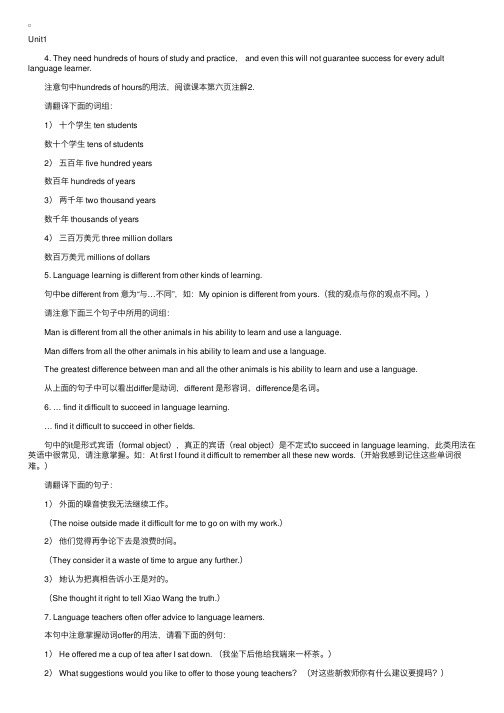
Unit1 4. They need hundreds of hours of study and practice, and even this will not guarantee success for every adult language learner. 注意句中hundreds of hours的⽤法,阅读课本第六页注解2. 请翻译下⾯的词组: 1)⼗个学⽣ ten students 数⼗个学⽣ tens of students 2)五百年 five hundred years 数百年 hundreds of years 3)两千年 two thousand years 数千年 thousands of years 4)三百万美元 three million dollars 数百万美元 millions of dollars 5. Language learning is different from other kinds of learning. 句中be different from 意为“与…不同”,如:My opinion is different from yours.(我的观点与你的观点不同。
) 请注意下⾯三个句⼦中所⽤的词组: Man is different from all the other animals in his ability to learn and use a language. Man differs from all the other animals in his ability to learn and use a language. The greatest difference between man and all the other animals is his ability to learn and use a language. 从上⾯的句⼦中可以看出differ是动词,different 是形容词,difference是名词。
现代英语语法第一章讲解 自考本科段
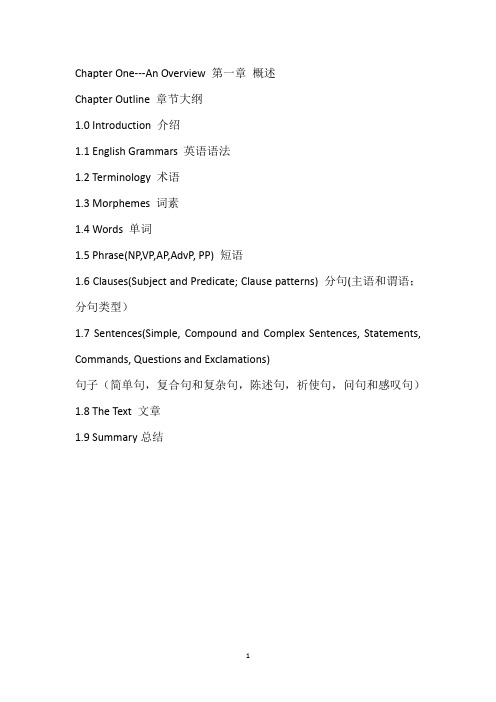
Chapter One---An Overview 第一章概述Chapter Outline 章节大纲1.0 Introduction 介绍1.1 English Grammars 英语语法1.2 Terminology 术语1.3 Morphemes 词素1.4 Words 单词1.5 Phrase(NP,VP,AP,AdvP, PP) 短语1.6 Clauses(Subject and Predicate; Clause patterns) 分句(主语和谓语;分句类型)1.7 Sentences(Simple, Compound and Complex Sentences, Statements, Commands, Questions and Exclamations)句子(简单句,复合句和复杂句,陈述句,祈使句,问句和感叹句)1.8 The Text 文章1.9 Summary总结1.0 IntroductionDe Montaigne states” the greater part of this world’s troubles are due to the questions of grammar”德蒙田说:“世界上大部分的麻烦都是由于语法问题造成的。
”2 tasks in this Chapter: 本章任务A.English grammar: a historically overview 英语语法:历史概述B.Grammar terminologies: revision and explanation B、语法术语:修订与解释1.1English grammars 英语语法16th century: Starting 16世纪:起始William Bullokar(1586) Bref Grammar for English 威廉布洛卡(1586)英语语法简介19th century: Developing 19世纪:发展900 related books published: 出版900本相关书籍The People’s grammar: English Grammar Difficulties for the Million(Shelley, 1848)《人民的语法:百万人的英语语法困难》(雪莱,1848)A grammar of the English Language : In a series of Letters( Cobbett, 1948)英语语法:在一系列字母中(科贝特,1948)概念:The body of rules that describe the structure of expressions in the English language.描述英语表达结构的规则体。
自考现代英语语法重点
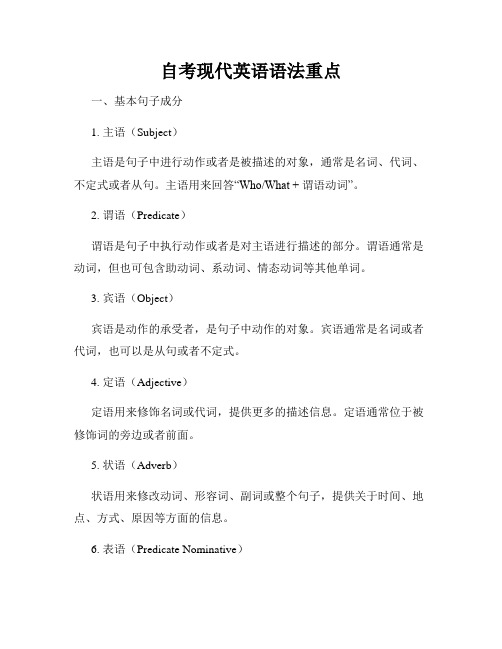
自考现代英语语法重点一、基本句子成分1. 主语(Subject)主语是句子中进行动作或者是被描述的对象,通常是名词、代词、不定式或者从句。
主语用来回答“Who/What + 谓语动词”。
2. 谓语(Predicate)谓语是句子中执行动作或者是对主语进行描述的部分。
谓语通常是动词,但也可包含助动词、系动词、情态动词等其他单词。
3. 宾语(Object)宾语是动作的承受者,是句子中动作的对象。
宾语通常是名词或者代词,也可以是从句或者不定式。
4. 定语(Adjective)定语用来修饰名词或代词,提供更多的描述信息。
定语通常位于被修饰词的旁边或者前面。
5. 状语(Adverb)状语用来修改动词、形容词、副词或整个句子,提供关于时间、地点、方式、原因等方面的信息。
6. 表语(Predicate Nominative)表语是指位于系动词之后,对主语进行补充说明、描述其身份、属性、状态等的一部分。
7. 同位语(Appositive)同位语用来进一步解释或说明前面的名词或代词,放在被解释的名词或代词的旁边。
8. 补语(Complement)补语用来补充或完善动词、名词、形容词等的意义,通常放在被补充词的后面。
二、句子结构1. 简单句(Simple Sentence)简单句是由一个主语和一个谓语构成的句子。
它可以有其他成分(如宾语、定语、状语等),但是只有一个主谓结构。
2. 并列句(Compound Sentence)并列句是由两个或多个简单句通过连词(如and、but、or、for等)连接而成的句子。
3. 复合句(Complex Sentence)复合句由一个主句和一个或多个从句构成。
主句可以独立成句,而从句不能独立成句。
4. 复合并列句(Compound-Complex Sentence)复合并列句是由两个或多个主句和一个或多个从句构成的句子。
三、动词形式1. 一般现在时(Simple Present)一般现在时用来表示经常性的动作、事实或习惯。
自考英语一课堂笔记unit1
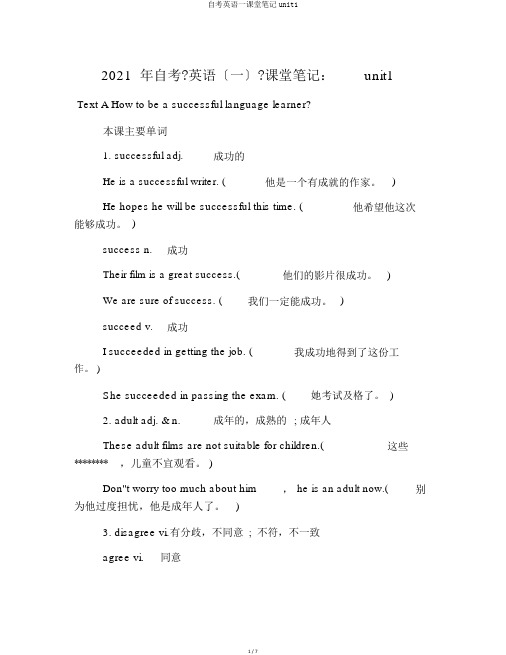
2021 年自考?英语〔一〕?课堂笔记:unit1Text A How to be a successful language learner?本课主要单词1. successful adj. 成功的He is a successful writer. ( 他是一个有成就的作家。
)He hopes he will be successful this time. ( 他希望他这次能够成功。
)success n. 成功Their film is a great success.( 他们的影片很成功。
)We are sure of success. ( 我们一定能成功。
)succeed v. 成功I succeeded in getting the job. ( 我成功地得到了这份工作。
)She succeeded in passing the exam. (她考试及格了。
)2. adult adj. & n. 成年的,成熟的; 成年人These adult films are not suitable for children.(这些******** ,儿童不宜观看。
)Don''t worry too much about him,he is an adult now.( 别为他过度担忧,他是成年人了。
)3.disagree vi.有分歧,不同意;不符,不一致agree vi.同意I disagree with you about this.〔对于这件事,我跟你的意见不同。
〕These figures disagree with last week''s results.(这些数据与上周的结果不符。
)I agree with what you said. ( 我同意你所说的。
)She agreed to the plan.( 她赞成这个方案。
)We haven''t agreed on the date of the meeting.( 我们还没商定会议的日期。
- 1、下载文档前请自行甄别文档内容的完整性,平台不提供额外的编辑、内容补充、找答案等附加服务。
- 2、"仅部分预览"的文档,不可在线预览部分如存在完整性等问题,可反馈申请退款(可完整预览的文档不适用该条件!)。
- 3、如文档侵犯您的权益,请联系客服反馈,我们会尽快为您处理(人工客服工作时间:9:00-18:30)。
第一章绪论the structure of English sentence 1.0 introduction -- The grammar unites hierarchy
Higher
1.2 Words
1.2.1 Words Class
1.2.2 word formation 构词法
a. Affixation 词缀法List具体见书9-10页
英语分前缀后缀和中缀,前缀加在词根之前,改变词义不改变词类。
后缀加在词根之后,改变词类不改变
b. Composition 复合法
两个或者两个以上的独立词构成一个复合词。
E.g.: manservant, snowfall, deadline, spotlight, world-famous, before-tax, whenever, whereas…
c. Convention 转化法
某个单词未经添加此罪就由一个词类转化为另一个词类。
Verbs to nouns: love, answer, doubt.
Adj. to verbs: daily(=daily newspaper), final(=final exam)
d. Blending 拼缀法
把两个词经行裁剪,掐头去尾,然后把这两个不完整的部分拼成一个词,在某些情况下只裁剪两个词中的一个词,把一个不完整的词和一个完整的词拼成另一个词。
P+P Motel (Motor + Hotel)
Smog (Smoke + Fog)
Brunch (Breakfast + Lunch)
W+P newscast (News + Broadcast)
Workfare (Work + Welfare)
P+W Medicaid (Medical + Aid)
Medicare (Medical + Care)
e. Back-formation 逆生法
英语中有很多-or,-er结尾的名词是由动词派生而来,但也不乏通过去掉这些名词词尾派生出来的动词。
e.g. Housekeep –Housekeeper Babysit – Babysitter
f. Shortening 缩略法
把较长的多音节单词裁剪成较短的单音节单词。
e.g.: Ad (Advertisement) Phone( Telephone) Lab(Laboratory)
g. Acronyms 首字母省略法
两种发音方式,按字母发音或者按拼音方法读音。
e.g.: UFO, FBI, VIP
1.3 Phrases
词组是按一定的语法规则,围绕一个中心词结合起来的一组词,中心词所属的词类决定词组类别及组合方式。
A phrase consists of one or more that one word, usually a string of words built up around a head word.
类别:Noun Phrase, Verb Phrase, Adjective Phrase, Adverb Phrase, Prepositional Phrase 1.3.1 The Noun Phrase 名词词组
名词词组以名词为中心词,并可能带有一个或几个修饰语。
(可以是词,词组,分句,可前置后置)
My neighbor is a noisy person. (determiner + adj + headword)
1.3.2 The Verb Phase 动词词组
以动词为中心,并可能带有助动词。
没有助动词的叫简单动词词组,有助动词的叫复杂动词词组。
The simple Verb Phrase and Complex Verb Phrase
She bought a book yesterday. (Simple)
I have never seen him before. (Complex)
根据其结构和功能又可分为限定动词词组(finite verb phrase)和非限定动词词组(non-finite verb phrase). 第一个动词为限定动词的词组叫做限定动词词组,主要特征是与主语保持数的一致并有时的标志。
第一个动词为非限定动词的词组叫做非限定动词词组,即动词不定式,-ing分词,-ed分词
The finite Verb Phrase and The non-finite Verb Phrase
The head word or the first element of a finite verb phrase is a finite verb, which bears the tense marker and sometimes keep in concord with the subject.
EX: She likes coffee.
The non-finite Verb Phrase is a phrase whose first element is a non-finite verb free of the constraints. Including -ing & -ed participle.
EX: I didn't expect you to be here.
1.3.3 The Adjective Phrase 形容词词组
以形容词为中心词,并可能带有前置或后置修饰语,前置语一般是副词,后置除福此外可以是词组或者分句。
I didn’t find the language difficult to learn. (head word + infinitive)
1.3.4 The Adverb Phrase 副词词组
副词词组以副词为中心词,组合方式是修饰语加副词,有时中心词之后还可以带有后置修饰语或补足成分。
He doesn’t work very hard indeed. (adv + headword + adv)
1.3.5 The Prepositional Phrase
介词词组以介词为中心词,通常为介词加名词词组组成。
There are a lot of people in the office. (headword + noun phrase)
1.4 Clause 分句
1.4.2 Clause Patterns Seven Clause Patterns:
SV: Subject + Verb I run.
SVC: Subject + verb + Complement I run fast.
SVO: Subject + Verb + Objective I read a book
SVOO: Subject + Verb+ Objective + Objective I give her a book.
SVOC: Subject + Verb + Objective + Complement I find the book interesting. SVA: Subject + Verb +Adverbial I live in Shanghai
SVOA: Subject + Verb +Objective +Adverbial I put my cloth into the closet.
1.5 Sentence
句子由一个或几个分句组成,有简单分句,并列分句。
并列和从属分句组成的叫复杂句。
既含并列又含从属的句子叫并列复杂句。
Simple Sentence: Contains one clause.
Compound Sentence: Contains more the one clause, the clauses related to one another by coordination.并列
Complex Sentence: Contains more the one clause, the clauses related to one another by subordination. 从属。
